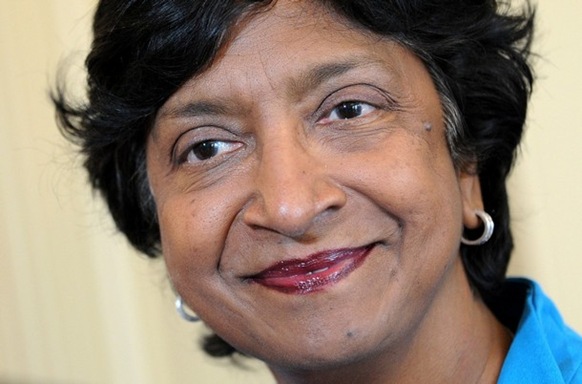 Both sides in Sri Lanka’s conflict may have committed war crimes and must suspend fighting to let tens of thousands of civilians escape, United Nations High Commissioner for Human Rights Navi Pillay said on Friday.
Both sides in Sri Lanka’s conflict may have committed war crimes and must suspend fighting to let tens of thousands of civilians escape, United Nations High Commissioner for Human Rights Navi Pillay said on Friday.
Warning that the loss of life may reach "catastrophic levels," she urged the government and Liberation Tigers of Tamil Eelam (LTTE) rebels to suspend hostilities to allow evacuation of up to 180,000 civilians trapped on the northeastern coast.
Pillay said the government had repeatedly shelled the designated "no-fire" zones for civilians and also cited reports that the separatist guerrillas were holding civilians as human shields and had shot some as they tried to flee.
"Certain actions being undertaken by the Sri Lankan military and by the LTTE may constitute violations of international human rights and humanitarian law," Pillay said in a statement.
"The world today is ever sensitive about such acts that could amount to war crimes and crimes against humanity," added the former U.N. war crimes judge, who is a member of the Tamil ethnic group and grew up in South Africa.
Pillay called on Sri Lanka’s government to grant full access to U.N. and other aid agencies to monitor human rights and humanitarian conditions amid reports of "severe malnutrition" among those trapped.
Sri Lanka’s military has encircled the LTTE Tamil Tigers in a mere 37 sq km (15 sq miles) of the island nation’s northeastern coast and is fighting to deal a death blow to a civil war that has raged off and on since 1983.
More than 2,800 civilians may have been killed and more than 7,000 injured since January 20, according to a range of credible sources, Pillay said. Many had been inside the "no-fire" zones.
Hundreds of children were believed to be among the dead.
The toll includes nearly 500 people killed and 1,000 injured in safe zones — the great majority attributed to heavy weapons — since a February 24 government announcement that such weapons would no longer be fired into the areas, according to the U.N. rights chief.
"The current level of civilian casualties is truly shocking and there are legitimate fears that the loss of life may reach catastrophic levels, if the fighting continues in this way," Pillay said.
"The brutal and inhuman treatment of civilians by the LTTE is utterly reprehensible and should be examined to see if it constitutes war crimes."
Walter Kaelin, the U.N. Secretary General’s representative on the human rights of internally displaced persons, also voiced grave concern at reports of LTTE rebels using civilians as human shields and preventing them from leaving the conflict zone.
Presenting an annual report to the U.N. Human Rights Council, he stressed that Sri Lanka’s government must protect and assist civilians fleeing the fighting. They must not be confined to camps and prevented from moving, he said.
Security screenings conducted upon their arrival in the camps must comply with strict standards, according to the Swiss expert who carried out a mission to Sri Lanka last September.
"The government does have legitimate security concerns to screen but this should be done promptly on an individual basis in accordance with judicial fairness," Kaelin told a news briefing. "Only those who as individuals are suspected of being violent or being a danger can be retained in these camps.."
(For updates you can share with your friends, follow TNN on Facebook and Twitter )
